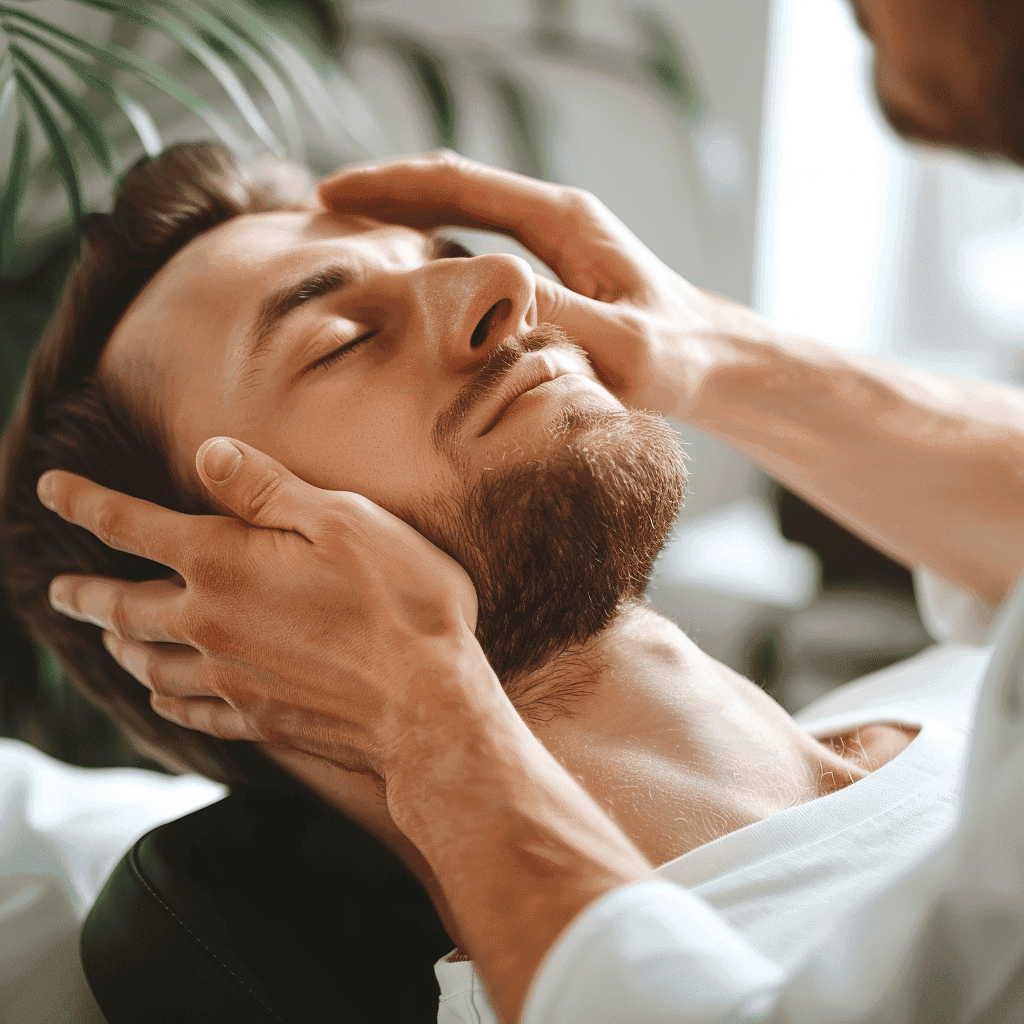Temporomandibular Joint (TMJ) disorders encompass a variety of conditions that affect the joint connecting the jaw to the skull. These disorders can cause pain in your jaw joint and the muscles controlling jaw movement. The complexity of TMJ disorders often requires a multidisciplinary approach for effective management. Understanding TMJ disorders’ nature, symptoms, and causes is crucial for determining the most appropriate treatment. In this article, you will learn about Chiropractic Care for TMJ Disorders in Issaquah.
Definition of TMJ
The TMJ is the hinge joint that connects the lower jaw (mandible) to the skull’s temporal bone, which is immediately in front of the ear on each side of your head. The joints are flexible, allowing the jaw to move smoothly up and down and side to side, enabling us to talk, chew, and yawn. Disorders of this joint can lead to pain and limitation in movement.
Common Symptoms of TMJ Disorders
Symptoms of TMJ disorders may include jaw pain or tenderness, aching pain in and around your ear, difficulty chewing or discomfort while chewing, aching facial pain, locking of the joint, making it difficult to open or close the mouth, and a clicking sound or grating sensation when opening the mouth or chewing. However, if there’s no pain or limitation of movement associated with your jaw clicking, you probably don’t need treatment for a TMJ disorder.
Chiropractic Care for TMJ Disorders
Chiropractors are health care professionals focused on the diagnosis and treatment of neuromuscular disorders, with an emphasis on treatment through manual adjustment and/or manipulation of the spine. Most chiropractors seek to reduce pain, improve patients’ functionality, and educate them on how they can account for their own health via exercise, ergonomics, and other therapies to treat back pain.
What Is a Chiropractor?
A chiropractor, also known as a doctor of chiropractic (DC), is a health care professional who focuses on diagnosing, treating, and preventing disorders of the musculoskeletal system and the nervous system, and the effects of these disorders on general health. Chiropractic services are often used to treat neuromusculoskeletal complaints, including but not limited to back pain, neck pain, pain in the joints of the arms or legs, and headaches.
Chiropractic Approaches to Health Care
Chiropractic care is based on the concept that the body can heal itself when given the right conditions. To this end, chiropractors use various non-invasive techniques, such as spinal adjustments, massage, and stretching, to treat conditions. The goal is to restore proper adjustment, ease pain, and support the body’s natural healing ability. Chiropractors may also offer guidance on diet, exercise, and lifestyle changes to help improve overall health and prevent future pain or dysfunction.
Causes and Diagnosis of TMJ Disorders
Many factors, including genetics, arthritis, or jaw injury can cause TMJ disorders. Some people who have jaw pain also tend to clench or grind their teeth (bruxism), although many people habitually clench or grind their teeth and never develop TMJ disorders.

Primary Causes of TMJ Disorders
The exact cause of a person’s TMJ disorder is often difficult to determine. Your pain may be due to a combination of factors, such as genetics, arthritis, or jaw injury. Some TMJ disorders can arise from the joint’s disk eroding or moving out of its proper adjustment, a damaged joint due to impact or disease, or the joint being damaged by the impact of the disease.
Diagnosing TMJ Disorders
Diagnosing TMJ disorders involves a comprehensive examination. This may include checking the joints and muscles for tenderness, clicking, popping, or difficulty moving. Your healthcare provider may also use several different imaging tests, including X-rays, computed tomography (CT) scans, or magnetic resonance imaging (MRI) to view the bones and soft tissues of the TMJ.
Chiropractic Care for TMJ Disorders
For those seeking a non-invasive and drug-free approach to treat TMJ disorders, chiropractic care offers several interventions. These interventions aim to alleviate pain, improve jaw function, and address the root cause of TMJ disorders.
Techniques for Jaw Adjustment
Chiropractors may use specific techniques to adjust the jaw and improve its adjustment. This can involve gentle pressure and manipulation of the jaw and surrounding muscles to reduce tension, improve mobility, and adjust the jaw properly with the temporal bone.

Identifying the Need for TMJ Adjustment
Not everyone with TMJ disorders requires chiropractic adjustment. The need for this intervention is determined based on a thorough assessment of the individual’s symptoms, pain severity, and joint function. Chiropractors will typically proceed with adjustments only if they believe it can provide significant relief and improved function.
How Chiropractic Care Aids TMJ Disorders
Chiropractic care provides a holistic approach to treating TMJ disorders, focusing on reducing pain, improving function, and promoting the body’s natural healing processes.
Performing Chiropractic Adjustments on the Jaw
Chiropractic adjustments on the jaw aim to correct misadjustments and improve mobility. These adjustments can help reduce pain, decrease inflammation, and improve range of motion in the jaw.
Alleviating Stress and Tension in the TMJ
Chiropractic care also relieves stress and tension in the muscles surrounding the TMJ. Techniques such as massage and soft tissue therapy can help relax these muscles, reducing pain and preventing further strain on the joint.
Addressing Underlying Conditions Contributing to TMJ Pain
Chiropractors look beyond the symptoms to identify and treat any underlying conditions contributing to TMJ pain. This holistic approach ensures that treatment is comprehensive and aimed at long-term relief.
Application of Soft Tissue Therapy in TMJ Treatment
Soft tissue therapy, including massage and myofascial release, is often used with chiropractic adjustments to treat TMJ disorders. These therapies can help alleviate muscle tightness and improve circulation, reducing pain and discomfort.
Benefits of Chiropractic Management for TMJ Pain
Chiropractic care offers several benefits for individuals suffering from TMJ disorders. It provides a non-invasive, drug-free option for pain management, reduces the need for surgical intervention, and focuses on treating the root cause of the disorder rather than just the symptoms.
Immediate and Long-term Benefits
Patients often experience immediate relief from pain and discomfort following chiropractic treatment, with long-term benefits including improved jaw function and decreased incidence of TMJ-related symptoms.

Comparing Chiropractic Care to Other TMJ Treatments
Chiropractic care for TMJ disorders emphasizes holistic health and wellness compared to other treatments. It avoids the risks associated with surgery and the side effects of prescription medications, making it a safe and effective option for many patients.
When Is Chiropractic Care Appropriate for TMJ?
Chiropractic care is most appropriate for TMJ disorders when symptoms are related to musculoskeletal issues, such as jaw misalignment or tension in the surrounding muscles. It is an excellent option for individuals looking for a non-invasive approach to manage their TMJ pain.
Indications for Chiropractic Adjustments in TMJ Therapy
Indications for chiropractic adjustments include chronic jaw pain, limited jaw movement, and recurrent headaches or earaches related to TMJ disorders. A chiropractor can assess whether these symptoms can be effectively treated with chiropractic care.
When to Consider Chiropractic Care for Your Jaw Health
Consider chiropractic care if you prefer a holistic and non-invasive approach to managing TMJ disorders, especially if traditional medical treatments have not provided relief or if you wish to avoid the potential risks of surgery and medication.
Limitations and Considerations
While chiropractic care can be highly effective for many individuals with TMJ disorders, it’s important to understand its limitations and consider all available treatment options.
When to Avoid Chiropractic Jaw Adjustments
Chiropractic jaw adjustments should be avoided in cases where TMJ disorders are caused by structural abnormalities in the jaw that require surgical intervention, or when there is an acute infection or tumor in the area.
Understanding the Limitations of Chiropractic Care for TMJ
Chiropractic care may not be suitable for all TMJ disorders, particularly those that require dental or surgical treatment. It’s important to have a comprehensive evaluation to determine the most appropriate treatment plan for your specific condition.
Integrating Chiropractic Care with Other Treatments
For the best outcomes, chiropractic care for TMJ disorders can be integrated with other treatments, such as dental care, physical therapy, and stress management techniques. This multidisciplinary approach ensures comprehensive treatment and addresses all aspects of the disorder.
Integrated Healthcare Approaches for TMJ Pain
An integrated healthcare approach involves collaboration among chiropractors, dentists, physical therapists, and other health professionals to provide a comprehensive treatment plan for TMJ disorders. This approach ensures that all underlying causes of TMJ pain are addressed.
Collaboration Between Chiropractors and Other Health Professionals
Effective management of TMJ disorders often requires collaboration between chiropractors and other health professionals. This team-based approach allows for sharing expertise and ensures that patients receive the most effective, comprehensive care possible.
Conclusion
Chiropractic care offers a valuable and effective option for managing TMJ disorders, providing relief from pain and improving jaw function without the need for invasive treatments. By taking a holistic and integrated approach to care, chiropractors can help patients achieve long-term relief from TMJ-related symptoms and improve their overall quality of life.
The Importance of a Comprehensive Approach to TMJ Care
A comprehensive approach to TMJ care, involving a combination of chiropractic treatment, lifestyle modifications, and collaboration with other healthcare professionals, can offer the most effective relief for TMJ disorders. This holistic approach addresses not only the physical symptoms but also the underlying causes of TMJ pain.
Future Perspectives on Chiropractic Treatments for TMJ Disorders
As research continues to evolve, the role of chiropractic care in treating TMJ disorders is likely to expand, offering new insights and approaches to managing this complex condition. With a focus on patient-centered care, chiropractic treatment remains a promising option for those suffering from TMJ pain.

